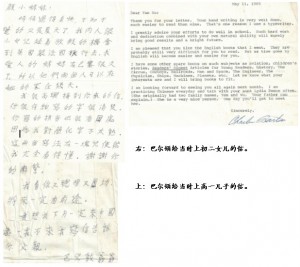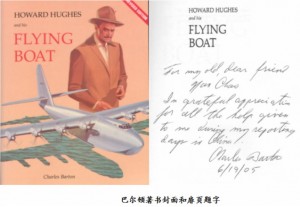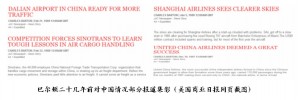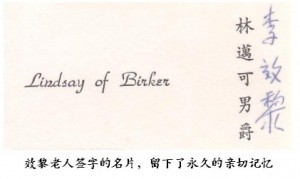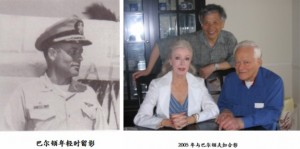颜超:我的美国老友巴尔顿
华夏文摘 12-09-21 09:05
查尔斯•巴尔顿是我的一位老朋友。他像一株长青树,不断攀登人生和知识的高峰,年届耄耋还在工作;尤为珍贵的是他有一颗未泯的童心和传统美国人的率直性格。我如今虽也已进入古稀之年,不时能和这样一位长我将近20岁的老年朋友通过电子邮件和电话联系,确是人生之一大幸事。
时光列车把我带回北京城里27年前一个秋高气爽的周日早上。我和爱人和尚在舞勺之年的一儿一女正准备出门,底层看门的大爷喊我下楼。那里设有全楼一百多家共用的唯一的一部电话。这座五层家属宿舍楼是原前的集体宿舍;每层楼除一排住室外,都有一个公用盥洗室和男,女公用厕所;每家做饭的炉子放在楼道。我们一家住在五楼的一间屋子里。我下楼到门口一看,不是让我接电话。却见一位精神矍铄的外国老人向前和我握手。他用洋腔十足的中文对我说:“我的姓是巴尔顿,我从美国来,你就是颜超先生吗?”那时国内还不太开放,很快招来很多好奇的围观。我很尴尬,按照当时的“涉外”规则,擅自把老外请进这样的“寒舍”岂不是“往社会主义脸上抹黑”!但看着围观的人群不减,我心里一横,竟自请他上楼。进屋之后,我说请他随意,用汉语,英语交谈均可。这样他才从容的坐下来用“混合语言”自我介绍,并说明来意。他说,“你姑姑住在华府郊外马里兰州的波多马克,离我住的不远。我住在弗吉尼亚州的阿灵顿。她是我的中文教师。这次我到北京,她把你的地址给我,托我看望你们”。他的坦率热情一下子拉近我们之间的距离,觉得好像是多年不见的老朋友。我让儿子下楼到胡同里的小店买了肉馅儿,忙活一阵之后,我们一家和这位洋客人围坐在放开的折叠桌子上吃起热喷喷的饺子。
饭桌上,我们才进一步了解这位美国客人的丰富人生经历。“我年轻时在斯坦福大学攻读物理。开飞机是我从小的梦想。二战期间我做了海军飞行员。在一次军官的派对上,我邂逅一位美丽的妙龄少女并一见钟情。她是美国驻法使馆北约经济顾问的千金,却决定下嫁我这个比她年长10岁的军官。二战后我在海军上校任上退役,作了民航机长。后来我迷上了中国文化和写作。于是一面学习中文,一面学习写作,作自由撰稿人,追寻自己的兴趣和理想”。说着他取出一本深蓝色封面的精装书,并在扉页上题字,说道:“这是我写的一本书, 用了将近五年时间。送给你希望你喜欢!”他又兴致勃勃地和我的孩子们交谈,用他不很流利的中文,问他们的学校情况,学习兴趣,将来打算,并介绍美国学生的情况。他说,按照美国人的习惯,你们叫我的名字查尔斯就行了。大家围坐小桌聊天,不觉天已擦黑,他才起身告辞。他回国后,还腾出宝贵时间费很大力气用中文给孩子们写信。此后每次出差,他都会想着给我的两个上中学的孩子带几本科普画册,大大激发了他们学习英语的兴趣。
回国后我抽空一口气读完了他的赠书。那本书近300页,书名为“霍华德•休斯和他的飞船”(Howard Hughes and his Flying Boat)。后来我才得知,该书1982年出版后被美国航天航空作家协会评为当年最佳非文学航空书籍。那本书所记述的是霍华德•休斯的事迹。他是美国著名航空家,工程师、企业家、电影导演、慈善家;也是一位当时的世界级富豪。书中讲的是休斯设计制造巨型水上飞机“云杉鹅”(Spruce Goose)的故事。那飞机至今还保持着最大翼展的世界纪录。其机身高度同空中客车A380相同,并列世界第一;但是如果不算起落架的话,“云杉鹅”就要高于空中客车A380。其长度仅次于安-225,波音747和空中客车A380居世界第四位。霍华德•休斯曾亲自操纵“云杉鹅”于1947年11月2日飞行了1英里。我从史料和书评得知,休斯生前严厉禁止身边的人讲述或写作有关他的事迹。以致休斯逝世后,有关这个在当时技术条件下设计制造出来的传奇的巨型飞机的史实长期掩埋于世。贾克•瑞尔 (Jack Real),一位休斯的老友和知己写道:“ 关于休斯的书,我读过13本,但有关飞船的史实,巴尔顿的书写的最好”。评论说:“巴尔顿以他真挚的求知精神赢得了众多当年从业人员的信任,以他丰富的航空知识和经验激发了他们对过去创新经历的回忆。由此他获得了许多参加者珍贵的第一手回忆材料。写出了一般记者无法办到的,又有生动描写,又有很高技术含量的记述这位现代巨型客机先驱的文字”。
也许因为这本书的成功,再加上他粗通中文,转年美国商业日报(U.S. Journal of Commerce)聘他为特约记者来华考察,报道中国航空货运事业的发展情况。那时对外国人来华有许多限制,从年初,他就递交了访问提纲和许多个人背景材料,又找了好几个部门,直到六月份才获准来京采访。那次访问和相关报道获得了意想不到的成功。接着,美国商业日报聘他为特约记者,报道中国民航发展情况。他在采访过程中不是简单的单方面提问,而是也为被访人着想,针对话题坦诚的提出许多具体建议。这大大增进了中方对他的信任和了解。记得他跟我说,在访谈中他问一位官员,为什么你们把重点放在订购美国飞机,对地面设备订购却显得薄弱。中方说,我们信任美国飞机的质量,现在资金有限,先捡重要的解决。巴尔顿尽自己所知说明地面设备的重要作用,并热情邀请中方委派专业人员和他见面,向他们介绍讲解美方的有关地面设备的技术以及他认为适合中国使用的产品。接着,中国民航的高层人士开始接受他的采访并同意将谈话录音。我将这些录音材料摘要翻译,他送中方核实同意后,作为采写的第一手材料。回国后,他写成了一篇改革开放初期中国民航迅速发展的长篇通讯报道。在美国商业日报上登出后在美国业界引起不小反响。
有一次我们单位组织去北戴河度假一周。刚好他来京采访有一段空挡时间。他欣然接受了我的邀请,参加我们单位的集体活动。到了北戴河,他和我们一家和同事们一起游泳,进餐,很快和大家熟悉起来。那时我们单位租住的招待所条件简陋,不能洗热水澡。他住饭店,得知这种情况后,他想出一个巧办法。他在一边写作,我和同事们自带毛巾到他房间洗手间轮流洗澡。回京前我们去周边风景区老龙头和山海关旅游也带着他。他和孩子们用简单的英语交谈,向同事们请教汉语知识,大家在一起相处非常快乐。那时国内洋人不多,我们队伍中夹着一个随便聊天的老外,不时引来不少好奇的目光。
1987年我得到外方资助到苏黎世瑞士联邦理工大学参加科研项目。翌年春,得到姑姑寄来飞往华盛顿的机票,我请了两周假,并在事前告诉了巴尔顿。他对我说,他理解我能来趟美国真不容易。他要我匀出两天,安排我住在他家,以便能尽量多看看美国,少花钱多办事。一天清早,他如约开车到姑姑家接我。他说,“首都华盛顿是一个了解美国的窗口。我想陪你先参观此地有代表性的博物馆,访问一些朋友,也想安排你去趟纽约开开眼界。我先领你熟悉华盛顿和它的周边,咱们先进城吧”!他恨不得在短短的两天中让我看完所有他认为最有意义的地方,会见所有他认为最需要认识的人。他这种热心肠,让我有说不出的感激。他首先带我到国家航空航天博物馆。入口近处的贩卖部还在热卖他写的书。这里是他最熟悉的地方。他一边领我参观,一面给我讲解。走到展出二战期间飞机的展台,他不仅讲解飞机的技术结构,也满怀深情的讲起对日作战的故事。走出这家博物馆,又就近走进國家藝廊。这里是完全不同的艺术世界。那是一个阳光明媚的春天正午,简单吃过午饭后,他又领我沿着国家广场的大道漫步走向林肯纪念堂。出来后又领我去一家大书店,直到天黑我们才回家。
在回家的路上,巴尔顿特别用中文嘱咐我说,“你见了我的太太希望你说她很漂亮,这样她会特别高兴!”我理解这种美国人的观念习俗和我们的不同。到家之后,我拜见嫂夫人。她年过六旬,却保持着俊秀端庄的身材和明媚的面孔。于是,我遵瞩夸她保养有方,十分年轻漂亮,令她非常高兴。她对我来家热情欢迎,谈吐率直,一见如故,完全没有大使千金的架子。她一口气自我介绍说,“我先生从前收入不菲,都投进了几个子女的教育费用。后来他为了实现自己写作和学习中国文化的理想,做了自由撰稿人。但这样就不能像以前那样过富裕日子。我现晚间在肯尼迪中心的演出厅当领座员,补充一部分家用。白天空闲时我可以带你到周边看看”。 她知道我是穷留学生,没有拿我当外人,说道:“这周围富人很多,把很新很贵的衣服都送到附近的二手商店。我可以带你去看看,我自己的衣服也有很多在那里买的”。巴尔顿的家坐落在弗吉尼亚州阿灵顿县,是一座典型美国东海岸的老式宅邸。房前花园外面是一片宁静的树林。他介绍说,这房是已故岳父置办的,如今岳母和他们夫妻两同住。楼房里面房间很多,底层是起居室和饭厅。墙上挂着的绘画和壁炉前摆设的瓷器显示着主人昔日的显赫身份和女主人的高雅品位。
巴尔顿对我说,华府地区住着许多值得前往拜访的人士。他先就近领我到马里兰大学计算机系参观并介绍我认识一位教授同行。接着又开车带我会见一位很有成就的华人工程师兼公司老板。但最为难忘的是带我到马里兰州拜访李效黎,林迈可(Michael Francis Morris Lindsay )夫妇。林老先生是位英国学者,在1952年正式继承英国贵族头衔林赛男爵(Baron Lindsay of Birker)。头天晚上巴尔顿告诉我说,前些年在一次去北京的飞机上和一位邻座的老妇人攀谈,才得知她的传奇经历。她叫李效黎,出身山西显贵。年轻时就读于北平燕京大学。和英籍教师迈克尔•林赛(林迈可)结为伉俪。两人参加抗战,后来到了晋察冀边区和延安。巴尔顿在飞机上见效黎老人带着很重的行李就热心帮忙。效黎老人对他说,文革之后国内物质尚不丰富。在国外有些没大用的东西带给国内亲友还能派上不少用处。巴尔顿觉得这样作很有意义,从此自告奋勇,每有来华机会都帮效黎老人给国内亲友带东西。衣物不算,他说最沉的要算一台旧打字机。一来二去,他们成了好朋友。那天家访,林老先生腿脚不便,坐在一只垫子已经烂掉一半的老式木把扶手倚上。效黎老人看上去硬朗,但毕竟上了年纪,忙着热情招待,让我很过意不去。我请巴尔顿坐在一只凳子上,自己搬个板凳坐在林老先生旁边。老先生见我们来非常高兴,戏称巴尔顿是他们的空运大队长。我表达了对二老传奇人生的景仰,问老先生为何二战后没有留在中国。他说,他当年去延安是为了反法西斯。法西斯倒台以后他的使命完成,不愿搅进中国内部的政治漩涡,才重新返回故里。效黎老人说起文革期间回国所见以及回延安批评地方干部不体恤老百姓的情况。也许这话题勾起了林老先生的深思,他不由的批评中国的政治。效黎老人在一边听,不时打断他的话,说:“人家第一次来你就讲你的观点,别忘了他还得回国!”效黎老人又转身告诫我:“他说了你就当耳旁风,回国后可千万别乱说话!”她使我想起亲爱的中国老妈妈,而林老先生的话处处让我感到正义和智慧的闪光。一晃已经聊到傍晚,巴尔顿提醒我为了老人的健康,我们应该告辞。效黎老人拿出一张名片,在竖印的“林迈可男爵”旁边用刚劲的字体签上了“李效黎”,嘱我有机会一定来家做客。等我十几年后再到美国,林先生已经驾鹤西去,而效黎老人接着移居中国,后来辞世。那第一次见面竟成永别。
2005年我和老伴去美国看望女儿,邀请巴尔顿夫妇来家做客。此时他的老丈母娘已经过世。夫妻俩上了年纪,搬到一所城里的住房。他题赠我一本“霍华德•休斯和他的飞船”的再版大量发行的简装本。他高兴地告诉我说, 他写的书买的很好,特别是由于电影“飞行员”的上映,市场需求大增,也给他带来丰厚的收入。他说,他还在工作,所挣得的收入加上养老金能和社保使生活舒适无虞。我女儿为了答谢他们对她小时的关怀,邀请夫妇俩一起到他们所喜欢的一家中餐馆进餐。巴尔顿开车在前带路,女儿跟在后面。在高速路上,我注意到他开车的速度偏低,后面很多车等不及超车。我想到巴尔顿作为飞机驾驶员十几年前带我开车的风采,但如今他已是耄耋老人,岁月不饶人啊!去年和巴尔顿通电话,说他以90岁高龄刚刚退休。他说,除因早年驾机听力减弱,身体还算可以。我在万里之外,常常想念他,一位诚实,善良,时时想着为他人铺路的平凡可爱的美国老人。
2012 年于苏黎世
此文初稿写完后,曾寄给巴尔顿老人。他热心地提出意见,并寄来英文译稿。这给我一次学习英语的宝贵机会。我据他的意见又修改中文原稿,并在英译文做了相应变动。为了照顾老人健康,未再寄出请他校阅。若有纰漏,当由我负文责。现将英译稿一并附上,以飨读者。
My Old American Friend Barton
Translated by Charles Barton
Charles Barton is an old friend of mine. He is like an evergreen, constantly climbing up the peaks of life and knowledge. He is still working even though now he is a gray and venerable old man. Particularly precious is that he still retains a childlike innocence and the traditional straightforward disposition of Americans. Although nowadays I too have entered the age of “more than seventy winters”, from time to time I connect via e-mail and telephone with this old friend almost 20 years older than myself, and this truly is a great blessing in life.
I recall an occasion when the time train took me back to a crisp autumn day, 27 years ago in Beijing. My wife and I and our teenager son and daughter were just getting ready to go outside, when the elderly man who was ground-floor doorkeeper called me downstairs. In that whole building, the more than 100 residents shared only one telephone on the ground floor. This 5-story apartment building was originally the dormitory for a collective; each floor, besides a row of residence rooms, also had a common washroom and male and female public toilets, and each family also had a cooking stove placed in the hallway. My family lived in one room on the 5th floor. I went down to the ground-floor exit and saw that there was no phone call for me. Instead, I saw a hale and hearty-spirited old foreigner who advanced and shook hands with me. In outright foreign-accented Chinese, he said to me: “My name is Barton, and I come from the U.S. Are you Mr. Yan Chao?” At that time, China was still not too open, so this very quickly attracted many curious onlookers. I was very embarrassed, because according to then rules “relating to foreign nationals,” arbitrarily inviting a foreigner into such a “poor abode” —wouldn’t that just be like “throwing mud at socialism!” However, seeing that the crowd of onlookers had not diminished, I was emboldened at heart, and finally invited him to come upstairs. After entering our room, I invited him to freely use either Chinese or English to converse – either was OK. So, he then calmly sat down and using this “mixed language” introduced himself to me, and indicated why he had come. He said, “Your aunt lives in the Washington suburb of Potomac, Maryland, not far from where I live. I live in Arlington, Virginia. She is my Chinese teacher. When I arrived in Beijing this time, she gave me your address and asked me to visit you and your family.” His frank enthusiasm in one stroke narrowed the distance between us, and I felt like he was on old friend not seen for years. I had my son go down to the little shop in the alley to buy some mince meat. After being busy for a while, my family and this foreign guest sat down around a folding table we had opened up, and ate the freshly cooked jiaozi.
We then learned more about the rich life experience of this American guest. He said, “When I was a young man, I studied physics at StanfordUniversity. Flying was my childhood dream. During World War II, I was a naval air forces pilot. At an officers’ party, I unexpectedly met a beautiful young girl, and it was love at first sight. She was the daughter of the Economic Advisor to NATO at the US Embassy in Paris, France, and she decided to marry me – an officer 10 years older than she. After World War II, I retired as a Navy captain, and became a civilian airline pilot. Later, I became enamored of Chinese culture and writing. Thus, on one hand I studied the Chinese language, and on the other hand I studied writing; I worked as a freelance writer, and pursued my own interests and ideals.” After saying this, he took out a hardcover book with a deep-blue dustcover and writing an inscription on the title page, he said: “This is a book I wrote, and it took me almost 5 years time. I am giving it to you, and hope that you like it!” He animatedly got into a conversation with my children, and used his not very fluent Chinese to ask about their school situation, academic interests, and plans for the future, and described the situation of American students. He said that according to the customs of Americans, it would be fine if we called him by first name, Charles. Everyone sat around the small table and chatted, and without our realizing it, when he stood up to say goodbye, the day had already turned to night. After he returned to the U.S., he spared valuable time and expended great energy in writing letters in Chinese to our children. On each business trip after that, he was always able to be thoughtful enough to bring several popular science picture books, which he gave to my two children, then in middle school, and this greatly stimulated their interest in learning English.
After he returned home, I managed to find some time to finish reading his gift book at one sitting. That book, almost 300 pages long, was called Howard Hughes and His Flying Boat. Later, I found out that after this book was published in 1982, the United States Space & Aviation Writers Association selected it as the best non-fiction aviation book for that year. What the book described were the deeds of Howard Hughes. He was a famous American aviator, engineer, entrepreneur, film director, and philanthropist; and at that time he was a rich and powerful person at a world-class level. What the book talks about is the story of Hughes’ design, manufacture, and operation of a giant seaplane called the Spruce Goose. I learned from historical materials and book reviews that Hughes during his lifetime strictly prohibited those around him from talking or writing about his deeds. The result was that after his death, the historical facts related to this legendary giant seaplane designed and manufactured under the technical conditions at that time were for a long period hidden from the world. Jack Real, an old friend and confidant of Hughes, wrote: “I have read thirteen books regarding Howard Hughes, but of them all Howard Hughes and His Flying Boat by Charles Barton handles the flying boat story the best of all” One review said the following: “Barton with his sincere spirit for seeking knowledge won the trust of numerous Hughes employees of that year, and with his rich aviation knowledge and experience he stimulated their memories of that innovative experience of the past. From them, he obtained much valuable material in the form of first-hand memories of the participants. He has written a book which a general writer would have no way of completing; it not only has vivid descriptions, but also describes with very high-tech content this pioneer of the modern giant airliner.”
Perhaps due to this book’s success, on top of his basic knowledge of Chinese, in the following year the U.S. Journal of Commerce hired him as a special correspondent to travel to China for investigations, and for reporting on the development situation of China’s air freight industry. At that time, there were many restrictions on foreigners coming to China. At the beginning of the year, he submitted an outline of visits and background materials on a good many persons, and also wanted to see several departments; but it was not until June that he received permission to come to Beijing to gather materials and conduct interviews. That visit and the related reports obtained unimaginable success. Soon after, the Journal of Commerce hired him as a special correspondent, to report on China’s civil aviation development situation. During his interviews in China, he did not simply propose questions unilaterally, but took into consideration those interviewed, and openly and sincerely proposed a good many specific recommendations to focus the dialog. This greatly enhanced the Chinese side’s trust in and understanding of him. I remember that he once told me that during one interview he asked an official, why do you place the key points on orders for American aircraft, while your orders for ground equipment seem to be weak? The Chinese official replied that we trust the quality of American aircraft, but our current financial resources are limited, so the important thing to resolve is first picking up the aircraft. Barton employing as much of his own knowledge as possible described the important role of ground equipment, and enthusiastically invited the Chinese side to send specialists to come see him, and he would preliminarily explain to them the American side’s ground equipment technology, as well as the products he felt would be appropriate for the Chinese side’s use. Soon after, high-level figures in China’s civil aviation began to accept his requests for interviews, and agreed that the conversations could be tape recorded. I translated the gist of these recorded materials. After he sent them to the Chinese side to verify their agreement, they served as first-hand materials of the interviews and written reports. After returning to America, he wrote a long newsletter on the rapid development of China’s civil aviation in the early period of reform and opening up to the outside world. After this was published in the Journal of Commerce it induced no small response within the U.S. business circles.
One time, my work unit organized a week’s vacation in Beidaihe, a resort on the Bo Hai sea, east of Beijing. Just as that time he had come to Beijing on a visit, and had a short period of free time. He readily accepted my invitation to participate in my unit’s group activities. After arriving in Beidaihe, he and our families and colleagues swam and dined together, and he rapidly became familiar with everyone. The conditions at the guest house my unit had rented were primitive, so that we could not take hot baths. He was staying at a hotel, and after he learned of this situation, he came up with a clever way to handle it. While he was writing, I and my colleagues brought our own towels to his room and took turns taking baths in his bathroom. Before returning to Beijing, we went to see the surrounding scenic area’s Old Dragon’s Head and took the Shanhaiguan tour, and brought him along. Using simple English, he chatted with the children, and he asked us colleagues to give him some lessons on spoken Chinese, so that we all got along in an unusually happy manner. At that time, foreigners in China were not numerous, and our contingent, with a casually chatting foreigner sandwiched among us, from time to time attracted quite a few curious stares.
In 1987, I received foreign funding to travel to Zurich and participate in a research project at the Swiss Federal Institute of Technology. In spring of the following year, I received airline tickets my aunt had sent for a flight to Washington, DC. I asked for 2 weeks’ leave, and in advance informed Capt. Barton of this. He told me that he understood that my being able to travel to the U.S. really was not easy. He asked me to free up 2 days, and arranged for me to stay at his home, so that I could see America as much as possible, and get more done at less expense. Early one morning, as we had arranged, he drove to my aunt’s house to meet me. He said, “The capital, Washington, is a window for understanding America. I would like to accompany you on your first visit here; we can go to some representative museums in the city and visit some friends, and I also would like to arrange for you to go to New York to broaden your vision”. First I will lead you in becoming familiar with Washington and its surroundings. Let’s first go into the city!” He was very anxious to have me within the short space of 2 days get to see all the places which he considered most important, and to meet with all the people he felt I most needed to be aware of. In this warm-hearted manner, he made me feel grateful in an inexpressible way. He first took me to the NationalAir & SpaceMuseum. At the sales department near the entrance, we saw that the book he had written was still a best seller. This spot was his most familiar place. As he led me through the visit, he explained the exhibits for me. When we came to the display stands for World War II-era aircraft, he not only explained the technical structure of the aircraft, but also in a manner full of deep emotion told the story of U.S. operations against Japan. After exiting this museum, we walked over to and entered the nearby National Gallery of Art. Here was a completely different world of art. It was high noon on a spring day with the sun shining brightly, and after we had a simple lunch, he led me down an avenue along the National Mall in a slow stroll toward the Lincoln Memorial. After we came out from the memorial, he led me into a large bookstore, where we stayed long and it was already dark when we returned home.
On the way home, Barton especially in Chinese instructed me, “When you have met my wife, I hope you say she is very pretty; that way, she will be particularly pleased!” I understand this concept and custom of Americans and its differences from ours. After we got to his home, I paid respects to his wife. She was over sixty years old, but had maintained a delicate and dignified figure and beautiful face. So, in compliance with his request I praised her for keeping up her health properly and for looking so young and pretty, which made her quite pleased. She warmly welcomed me into her home, with a straightforward style of conversation, so that we immediately became fast friends. She completely lacked the supposed haughty manner of an ambassador’s daughter. In one breath, she introduced herself, saying “My husband’s former income was not meager, but he put it all into the education expenses for our several children. Later, in order to realize his own ideals of becoming a writer and studying Chinese culture, he worked as a freelance writer. But this could not be like the overly prosperous days of the past. In the evenings, I’m now working as an usher at the Kennedy Center Performance Hall, to supplement a part of the family expenses. During the day in free time I can take you out to look around.” She knew I was a poor student studying abroad, but did not take me as an outsider. She said, “There are a great many rich people around here, and they send all their unneeded very new and very expensive clothes to a second-hand store nearby. I can take you there to look around. My own clothes also include a good many items purchased there.” Barton’s home was located in Arlington County, Virginia, and was a typical old-style residence in the Eastern seaboard of the U.S. In front of the house was a garden, and outside was a tranquil woods. He remarked that this house was once purchased by his wife’s deceased father, and now his wife’s mother and he and his wife jointly lived there. Inside this multistory house were a good many rooms, with the living room and dining room on the ground floor. On the walls hung paintings, and porcelains set in front of the fireplace displayed the eminent status of its bygone-days master and mistress, and the elegant taste of its current mistress.
Barton told me that in the Washington area there lived a good many persons worth going to visit. He first led me on a visit to the nearby University of Maryland Department of Computer Science, and introduced me to a professor in the same technical field as mine. Then he drove me to meet a very accomplished Chinese engineer and company manager. However, most unforgettable was that he took me to Maryland to visit the couple Li Xiaoli and Lin Maike (Michael Francis Morris Lindsay). Old Mr. Lin was a British scholar who in 1952 formally inherited the British nobility title Baron Lindsay of Birker. The night before, Barton had told me that several years before, while in an airplane traveling to Beijing, he had struck up a conversation with an elderly woman in the next seat, and thus learned of her legendary experience. Her name was Li Xiaoli, and she had been born in Shanxi to dignitaries. In her youth, she had been a student at Beiping Yanjing (YenChing) University, where she joined in matrimony with a British native teacher, Michael Lindsay (Lin Maike). They both participated in the War of Resistance against Japan, and afterward reached the Shanxi-Chahar-Hebei border area and Yan’an. When Barton saw on the plane that old Xiaoli was carrying a very heavy suitcase he enthusiastically helped her with it. Old Xiaoli told him that after the Cultural Revolution, domestic material was no longer in abundance. In her suitcase, she was bringing from abroad several things without much use to give them to her friends and relatives, who would find plenty of uses for them. Barton felt that doing this made a lot of sense, and thereafter volunteered on each occasion of coming to China to help old Xiaoli by bringing in things for her friends and relatives in China. Not counting clothing and other daily-use articles, he told me that the heaviest thing carried was an old typewriter. Gradually they became good friends.
On the day Barton and I visited their house in Maryland, we found that old Mr. Lin was walking with difficulty; he was sitting on a cushion on a half-rotten, old-style armchair. Old Xiaoli still looked hale and hearty, but after all, she too was getting on in years. She was busy enthusiastically entertaining us two guests, and this made me feel very sorry. I asked Barton to sit on a chair and pulled up a stool for myself and sat down next to old Mr. Lin. The old scholar was extremely pleased to see that we had come to see him, and jokingly called Barton their air transport group commander. I expressed respect and admiration for the legendary lives of the couple, and asked the old man why they had not stayed in China after World War II. He said that he had gone to Yenan in order to counter Fascism. After the Fascists’ fall from power, his mission was accomplished, and he did not wish to get mixed up with China’s internal political turmoil, but just wanted to return to his home town. Old Xiaoli then said that during the Cultural Revolution, she had returned to her native China, and when arriving back in Yenan she criticized the situation of the local cadres’ lack of understanding and sympathy for the common people. Perhaps this topic aroused deep thought in old Mr. Lin, who couldn’t help but criticize China’s politics. Old Xiaoli, listening to this at the side, from time to time interrupted his talk, saying, “The first time these people come here and you have to go and express your viewpoint. Don’t forget that he has to return to China!” Old Xiaoli then turned to me and warned me: “He said you should take no heed of his words, and after returning to China, be sure not to speak carelessly about it!” She made me think of my dear old mother in China, while all of old Lin’s words were like flashes of justice and wisdom to me. In a flash, it was already getting toward evening, and Barton reminded me that because of these old folks’ health, we should take our leave. Old Xiaoli took out a card, on which was vertically printed “Lin Maike [Michael Lindsay], Baron.” On the side of his name, using bold characters, she signed her own name, “Li Xiaoli,” and asked me if the opportunity arose, I should certainly come stay with them as a guest. When I returned to America 10 some years later, I found that Mr. Lin already had” “flew on a crane to the Western Paradise” and that old Xiaoli soon after his passing had moved back to China, and later passed away herself. That first meeting had become also a farewell.
In 2005, my wife and I traveled to the U.S. to visit our daughter, and I invited the Bartons to her house. At that time, his wife’s old mother had passed away. He and his wife were getting on in years, and had moved into a townhouse. He gave me a signed copy of the 2nd edition of his book, Howard Hughes and His Flying Boat, a large number of which had been released in paperback. He happily told me that this book he had written was selling very well. In particular, due to showings of the film The Aviator, the market demand for the book had increased, and also had brought in a substantial income for him. He said he was still working, and that the earned income plus his pension and social security payments were able to provide a comfortable life without any worry. My daughter, in order to express appreciation for the hours of loving care they had shown to her, invited the couple to go together with herself and us to the Bartons’ favorite Chinese restaurant for dinner. Barton was driving the car in front, to lead the way, while our daughter was following behind him. On the highway, I noticed that he was driving rather slowly, and behind us were many cars which couldn’t wait to get past him. I thought about Barton’s graceful bearing, acting just like an aircraft pilot, when he drove me around Washington 17 years before that time; but now he had already become a very old man, and time and tide wait for no one! Last year, I spoke to Barton over the phone, and he said that having reached the advanced age of 90 years he had just retired. He also said that other than some loss of hearing due to piloting during his early years, his health was still OK. I am thousands of miles away, but often miss him – an honest, kindhearted, simple and likable old American who often thinks to pave the way for others.


